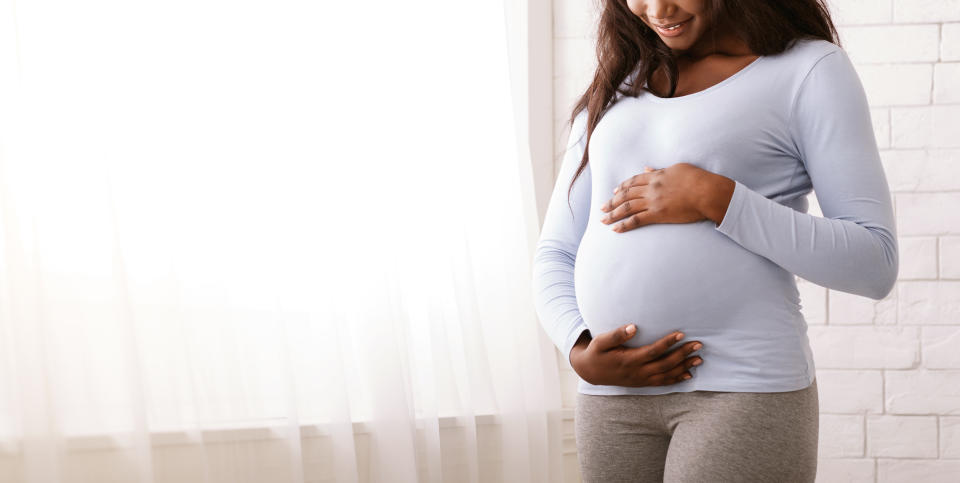No amount of coffee safe during pregnancy, scientist warns

Pregnant women or those hoping to conceive should avoid coffee altogether, a scientist has urged.
Excessive caffeine consumption during pregnancy has been linked to an increased risk of low birthweight and miscarriages, however, the NHS states 200mg – around two mugs of instant coffee – a day is safe.
To better understand the potential dangers, a scientist from Reykjavik University analysed 48 studies carried out in the past 20 years.
Read more: Heart disease could be prevented in the womb, study suggests
Although the results were mixed, Professor Jack James concluded there is “substantial cumulative evidence” that drinking coffee while pregnant is linked to everything from a miscarriage and stillbirth to childhood obesity and even leukaemia.
Being cautious, he stressed no amount of coffee should be considered safe while expecting.
Not everyone is convinced, however, with experts calling the research “overly alarmist” and “of questionable significance”.
‘Evidence supports pregnant women avoiding caffeine’
As well as the NHS, the American College of Obstetricians and Gynecologists, the Dietary Guidelines for Americans, and the European Food Safety Authority all recommend a maximum 200mg caffeine consumption a day during pregnancy.
Professor James warned, however, “caffeine [is] probably the most widely consumed psychoactive substance in history” with limited evidence as to its effects among mothers-to-be.
More than four in five pregnant women in the US (82%) and France (91%) alone drink coffee every day, he wrote in The BMJ.
Read more: 'Womb scratching' before IVF 'does not boost chance of live birth'
Caffeine crosses the placenta, exposing a foetus to similar levels to those circulating in the mother’s bloodstream. Unlike adults, developing babies lack the enzyme produced by the liver to break caffeine down.
To learn more about the risks, Prof James analysed studies of varying quality that looked for a link between caffeine consumption in pregnancy and the following: miscarriages, stillbirths, being a low birthweight and/or small for gestational age, a preterm birth, childhood leukaemia, and a child being overweight or obese.
Of the observational studies – where researchers observe the effect of a risk factor without trying to change who is exposed to it – 32 suggested caffeine significantly increases the risk of adverse pregnancy outcomes, while the remaining 10 found no link or an inconclusive association.
Out of the 17 meta-analyses, 14 found a link between maternal caffeine consumption and miscarriages, stillbirths, a low birthweight and/or being small for gestational age, and childhood leukaemia.
Meta-analyses assess the results of previous research in an attempt to derive a single conclusion.
No meta-analysis investigated a link between maternal caffeine consumption and a child being overweight or obese, however, four of five observational studies reported a significant association.
Prof James stressed his research may have been impacted by other factors, like smoking and the ability of a woman to recall how much caffeine she consumed during pregnancy.
Morning sickness can also be predictive of a healthy pregnancy. Women who experience this nausea and vomiting may cut their caffeine consumption as a result, added Prof James.
Read more: NHS funds less than 30% of fertility treatments in parts of England
Nevertheless, he pointed out the findings show a dose-response relationship, with more caffeine being linked to worse pregnancy outcomes.
Some of the studies also found no threshold below which negative outcomes were absent, suggesting no amount of caffeine is totally safe.
As a result, Pro James has called for existing health recommendations to undergo “radical revision".
“Specifically, the cumulative scientific evidence supports pregnant women and women contemplating pregnancy being advised to avoid caffeine,” he said.

‘The last thing we need is to cause unnecessary anxiety’
Not everyone agrees with Prof James’ conclusion.
Dr Luke Grzeskowiak, from the University of Adelaide, called it “just one individual’s different perspective on existing evidence”, with previous research suggesting only high caffeine consumption can be dangerous.
“The author's conclusion that all pregnant women and women contemplating pregnancy should avoid caffeine is overly alarmist and inconsistent with the evidence,” he said.
“There are so many dos and don'ts associated with pregnancy and the last thing we need is to cause unnecessary anxiety.
“At the end of the day, women should be reassured that caffeine can be consumed in moderation during pregnancy.”
Dr Alex Polyakov, from the University of Melbourne, called the risk of low caffeine consumption “unclear, but likely to be small and of questionable clinical significance”.
He added, however, it may be “sensible” to encourage pregnant women or hopeful mothers to limit their intake.
Several experts pointed out the women in the studies may have incorrectly recalled the caffeine they consumed while pregnant, causing lower doses to look more harmful than they are.

“The observational nature of this data with its inherent bias does not indicate with any certainty that low doses of caffeine are harmful, and the current advice to avoid high doses of caffeine are unlikely to change,” said Professor Andrew Shennan, from King’s College London.
Dr Adam Jacobs, from the contract research organisation Premier Research in London, also pointed out that pregnant women have been advised to limit caffeine for at least four decades.
Those who continue to consume it may therefore be less likely to follow health advice in general, which is difficult to take into account.
“Overall, I think if I were a pregnant woman, I don't think this paper would make me overly concerned about drinking the occasional cup of coffee,” said Dr Jacobs.
Dr Cathy Knight-Agarwal from the University of Canberra was more open to the results.
“If pregnant women cut out caffeinated products from their diet would this compromise their nutritional status and the answer is a big no,” she said.
“Therefore, from my perspective the only benefit of consuming such products is perhaps the psychological pleasure they induce – which is all very well and good but is this enough of a reason not to cease consumption during pregnancy?
“Perhaps caffeine intake advice during pregnancy should mirror that of alcohol? This is a topic for further debate.”


